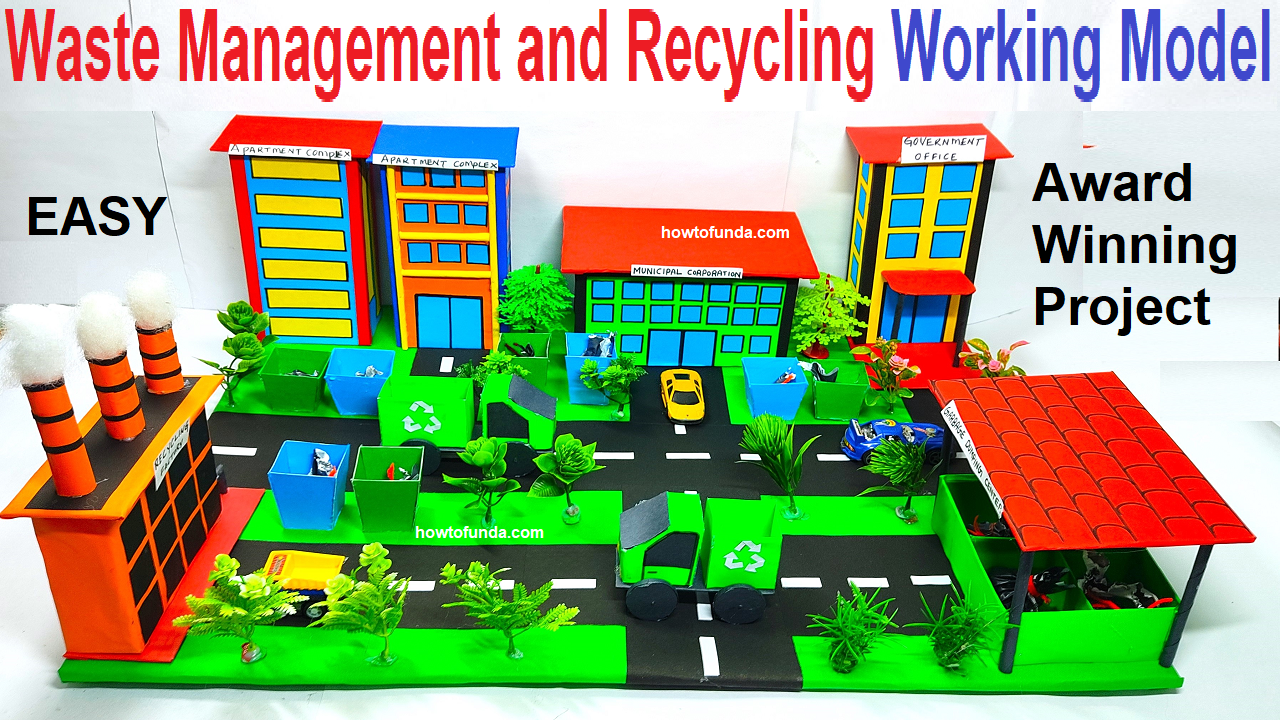Here are 20 science project ideas focused on waste management, spanning various topics from recycling to waste reduction and innovative disposal methods:

1. Composting Organic Waste
- Objective: Investigate the process and benefits of composting organic waste.
- Description: Create a compost bin and track the decomposition process of different organic materials. Measure the impact on soil quality when used as fertilizer.
2. Recycling Paper Waste
- Objective: Explore methods for recycling paper and measure their efficiency.
- Description: Create recycled paper from used paper products and compare the quality to commercially recycled paper.
3. Biodegradable Plastics
- Objective: Test the degradation rates of different biodegradable plastics.
- Description: Bury various biodegradable plastics and monitor their decomposition over time compared to traditional plastics.
4. Impact of E-Waste on the Environment
- Objective: Study the environmental impact of electronic waste.
- Description: Analyze soil and water samples from areas with high e-waste disposal to detect contamination levels.
5. Upcycling Waste Materials
- Objective: Create useful products from waste materials through upcycling.
- Description: Design and build new items (e.g., furniture, accessories) using discarded materials and evaluate their practicality and durability.
6. Reducing Food Waste
- Objective: Develop strategies to reduce food waste in households.
- Description: Implement and track the effectiveness of different food waste reduction techniques (e.g., meal planning, portion control).
7. Vermicomposting with Worms
- Objective: Examine how different types of organic waste affect the efficiency of vermicomposting.
- Description: Use worms to compost various organic materials and measure the nutrient content of the resulting compost.
8. Plastic Bottle Recycling
- Objective: Investigate the process of recycling plastic bottles into new products.
- Description: Collect plastic bottles, process them into reusable materials, and create new items like planters or building blocks.
9. Waste Management in Schools
- Objective: Assess the effectiveness of waste management programs in schools.
- Description: Implement a recycling and composting program in a school and measure the reduction in waste sent to landfills.
10. Decomposition Rates of Various Materials
- Objective: Compare the decomposition rates of different types of waste materials.
- Description: Bury or place materials like paper, plastic, metal, and organic waste in controlled environments and monitor their breakdown over time.
11. Impact of Landfills on Local Ecosystems
- Objective: Study the effects of landfill sites on surrounding ecosystems.
- Description: Analyze soil and water samples near a landfill to detect pollutants and assess the impact on local flora and fauna.
12. Homemade Biogas Production
- Objective: Create biogas from organic waste and measure its efficiency as a fuel source.
- Description: Build a simple biogas digester using kitchen waste and capture the gas produced to test its use for cooking or lighting.
13. Reducing Single-Use Plastics
- Objective: Develop strategies to reduce single-use plastic consumption.
- Description: Implement a plastic reduction plan in a community or school and measure the decrease in plastic waste.
14. Ocean Plastic Cleanup
- Objective: Explore methods for removing plastic waste from oceans.
- Description: Design a prototype device or system to capture and remove plastic from water bodies and test its effectiveness.
15. Anaerobic Digestion for Waste Management
- Objective: Investigate the process of anaerobic digestion for managing organic waste.
- Description: Set up an anaerobic digester and measure the production of biogas and the reduction of waste volume.
16. Impact of Microplastics on Marine Life
- Objective: Study the effects of microplastics on aquatic organisms.
- Description: Expose small marine organisms to microplastics and observe any changes in their health and behavior.
17. Effective Waste Segregation Techniques
- Objective: Evaluate different methods of waste segregation and their impact on recycling rates.
- Description: Implement various segregation techniques and track the increase in recyclable materials collected.
18. DIY Waste Incinerator
- Objective: Build a small-scale incinerator to test the efficiency and environmental impact of burning waste.
- Description: Construct an incinerator, burn different types of waste, and measure emissions and ash residue.
19. Recycling Metals from Electronic Waste
- Objective: Extract and recycle valuable metals from e-waste.
- Description: Disassemble electronic devices, separate the metal components, and test methods for recovering metals like gold, silver, and copper.
20. Community-Based Recycling Programs
- Objective: Develop and implement a recycling program in a community and measure its success.
- Description: Organize a recycling initiative, educate participants, and track the amount of waste diverted from landfills.
Conclusion:
These science project ideas cover a broad range of topics related to waste management, providing opportunities for practical experiments and valuable learning experiences. Whether focusing on recycling, reducing waste, or exploring innovative disposal methods, these projects can help highlight the importance of effective waste management practices and their impact on the environment.

